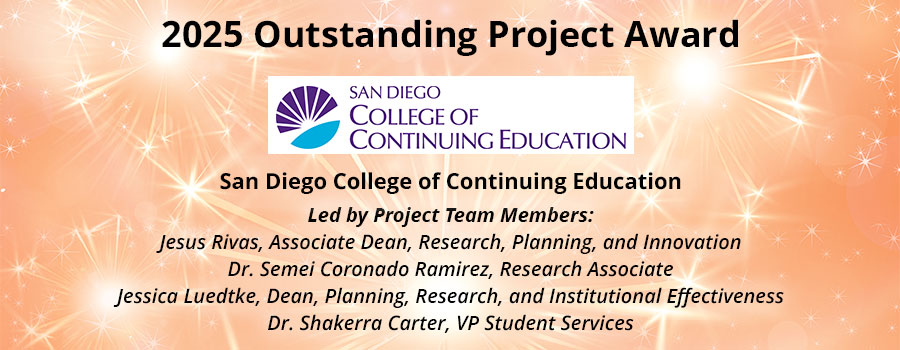
San Diego College of Continuing Education
Led by Project Team Members:
Jesus Rivas, Associate Dean, Research, Planning, and Innovation
Dr. Semei Coronado Ramirez, Research Associate
Jessica Luedtke, Dean, Planning, Research, and Institutional Effectiveness
Dr. Shakerra Carter, VP Student Services
In celebration of their hard work and dedication, The RP Group is pleased to honor San Diego College of Continuing Education (SDCCE) with the 2025 RP Group Outstanding Project Award.
Their project, “Crossing Borders, Bridging Identities: Empowering Binational Students at the US–Mexico Border,” was focused on developing research-based recommendations to support the success of binational students at SDCCE. The recommendations aimed to scale effective practices across the institution, address the distinct needs of subgroups within the binational population, and account for the various stages of the student journey, including access, retention, completion, and transition.
Research efforts were guided by questions exploring the challenges faced by binational students, the coping mechanisms they adopt, the success of existing interventions, and the potential for new interventions. The study also examined how these factors interact with group membership and manifest throughout the student journey.
To answer these questions, a mixed-methods approach was implemented. A literature review provided a theoretical foundation, incorporating cultural adaptation theory, social capital theory, and border theory to understand binational students’ experiences. Qualitative research captured the richness and texture of their lived experiences, while quantitative research quantified these experiences to prioritize resource allocation effectively. Multi-stakeholder facilitated discussions ensured that the research engaged students and institutional stakeholders, amplifying their voices and fostering a collaborative environment.
The study focused on binational Mexican students enrolled at SDCCE. These students are defined as individuals with significant ties to two or more nations, demonstrated through descent, cultural identity, residency, or frequent border crossings. Key findings highlight the complex interplay of cultural and social dynamics. Binational students often embody bicultural identities, navigating unique border spaces that are both geographic and ideological. Social capital within their networks facilitates their upward mobility, while the process of cultural adaptation presents challenges that require tailored support.
Qualitative data revealed that binational students aim to achieve academic milestones, secure meaningful employment, and contribute positively to their communities. They face barriers such as transportation challenges, cultural adaptation struggles, and balancing work and education. Despite these hurdles, they exhibit resilience by leveraging strengths such as determination, flexibility, emotional intelligence, and strong support networks. Quantitative data showed that their top goals include earning certifications, improving English proficiency, and finding better jobs, with English proficiency emerging as the most critical. Challenges such as balancing responsibilities, financial constraints, and job-related conflicts were also identified. Effective supports included certifications, low-cost classes, and flexible scheduling.
Based on these findings, SDCCE will prioritize free and flexible course offerings, resources to enhance English proficiency, and job readiness programs. The project’s framework will be assessed for scalability to other binational and bicultural populations, including refugees from Haiti, Ukraine, or Afghanistan and immigrant students from China or Vietnam. This inclusive approach ensures that shared goals, challenges, strengths, and supports are leveraged, while cultural differences are respected. Practitioner participation will remain integral to the project’s design and implementation, with executive leadership advocating for the integration of student needs and perspectives into institutional policies and practices.
This project not only addresses immediate student needs but also contributes to a broader understanding of equity in education. Its comprehensive, equity-conscious design ensures that the findings are impactful, scalable, and adaptable, positioning SDCCE as a leader in fostering student success across diverse populations.